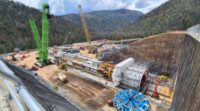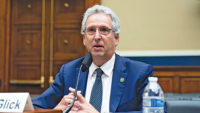Richard Wankmuller, a veteran American engineering executive, started his tenure on June 29 as CEO of Australia's Cardno Ltd. as the Brisbane-based professional services firm copes with falling profits, market gyrations and a possible takeover by a private equity firm.
Wankmuller, the former president of rival Australian firm GHD Group Pty Ltd.'s North American operations who was named by Cardno's board as CEO and managing director in late May after a search, has relocated to Brisbane and now is visiting its Asia-Pacific, Europe and North America offices, says the company.
Wankmuller replaces Australian Michael Renshaw, who left the firm in January. Renshaw had been in the top role only since early 2014, after guiding its North American expansion. Wankmuller also was a director of global GHD and played a key role in its 2014 acquisition of environmental services and construction firm Conestoga-Rovers Associates.
Cardno ranks at No. 38 on ENR's latest list of the Top 150 Global Design Firms, with $1.19 billion reported in global design billings, mostly in transportation and environmental market sectors. It has about 8,000 employees.
However, the firm in May said it expects to have to write down $154 million on the value of its U.S. and Ecuador businesses, citing impacts from oil and gas market changes, weather and a probe into "questionable payments" by its Ecuadorian infrastructure subsidiary, Cardno Caminosca, linked to public contracts.
Former acting CEO and current CFO Graham Yerbury earlier this year had noted the firm's cooperation with authorities. He said the Ecuador firm made up only about 3% of Cardno revenue. The formal probe still is ongoing, says a Cardno spokeswoman.
Wankmuller's former employer GHD also had issues on the ethics front. The World Bank in 2013 debarred the Sydney-based firm and two Indonesia subsidiaries for one year from bank-financed projects after a review found the local units and a subconsultant had overbilled on a now-completed consulting contract for post-tsunami reconstruction.
Cardno, meanwhile, forecast that net profits for the year ending June 30 would be about $37 million to $39 million, compared to nearly $59 million for the previous year. Year-end results will be announced on Aug. 18.
The firm warned that the underperformance of its Americas region had prompted “a reassessment” of the business, with speculation in the Australian business media that it might sell off those assets to save the Australian operation.
"Despite these near-term challenges, we continue to grow our backlog in the Americas and remain optimistic about the performance of the business in the coming year," said Yerbury.
Continuing sluggishness in Australian mining and infrastructure spending also has hurt, but the firm's outlook on its local business was "broadly positive," said Yerbury. "We are well positioned to take advantage of any improvement in the economy."
But the firm's share-price drop has led Australian media to speculate that the firm is the target of private equity acquisition interest. The Courier-Mail in late May said the rumored buyer, Crescent Capital, has bought up to a 19% stake.
Under Australian law, "buyers cannot exceed 20% in a single ‘swoop’ without instigating a takeover bid," said one online report. Press reports also indicate that Renshaw and another former Cardno CEO, Andrew Buckley, may be involved in the Crescent dealings.
Neither Renshaw nor Cardno would confirm the former CEOs' involvement with Crescent. A Cardno spokeswoman confirms Crescent now is a "significant" shareholder.
"I am confident of our ability to work our way through the current challenges and realise the potential of Cardno," says Wankmuller.





Post a comment to this article
Report Abusive Comment